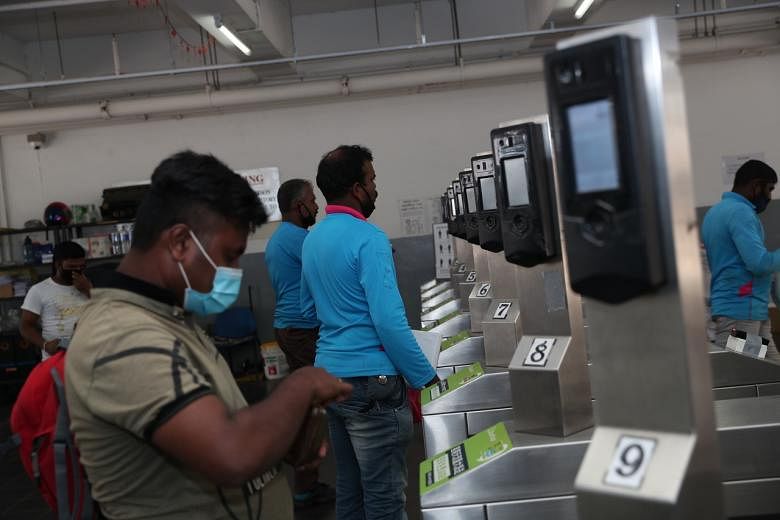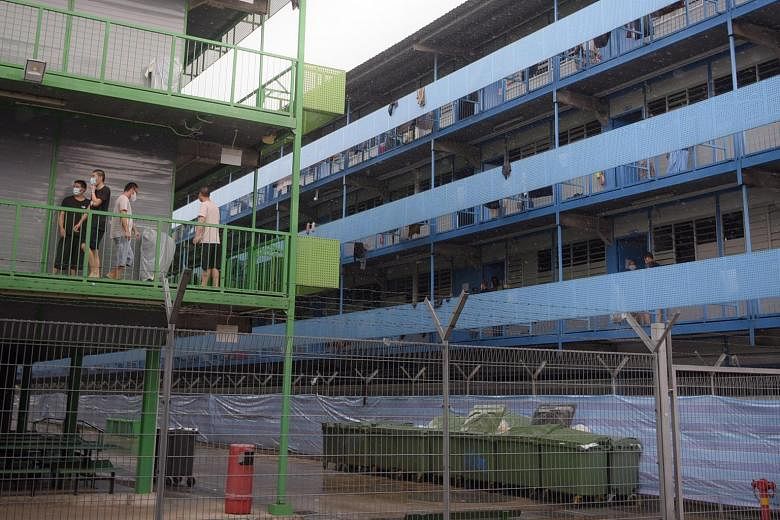About one in six foreign workers living in dormitories contracted Covid-19, a calculation based on Singapore's official tally showed, but the true infection rate in the dormitories is likely to be higher than this, experts say.
If accurate, however, an infection rate of one in six would not be enough for herd immunity to develop in the migrant worker population, they added.
A total of 52,425 out of 323,000 workers had been infected as of Wednesday.
In most countries, the number of "cryptic" infections - which are infections missed by the official case count - is probably around five to 10 times greater than the number of officially diagnosed cases, said Associate Professor Alex Cook, vice-dean of research at the National University of Singapore's Saw Swee Hock School of Public Health.
They occur because an individual with a negative result at the point of testing may become infected in the future or may have recovered from a previous infection.
However, the close monitoring of the outbreak in the dormitories by hospitals and the multi-ministry task force, including testing every worker, would mean that there are fewer cryptic infections among that population than in the general population here or elsewhere, Prof Cook said.
The only way to know the true infection rate would be to conduct large-scale serological tests.
These involve taking a small amount of blood and testing it for antibodies that indicate a past infection.
"Until the results of serological studies become available, we can't tell whether infections are just a little more than 52,000 and we identified almost all of the cases, or whether there are four or five times as many infections as cases," Prof Cook added.
Professor Teo Yik Ying, dean of the Saw Swee Hock School of Public Health, said that given that most infected foreign workers are asymptomatic or mildly symptomatic, and belong to a generally young and healthy demographic, it is even more likely that some of these infected patients do not know that they had the virus, resulting in under-reporting of dormitory cases.
Prof Cook said that for herd immunity to be achieved in any population, around half of its members would need to be infected. For dormitories, given the high density, around 70 per cent to 80 per cent of each dormitory would have to be infected.
But herd immunity may not be a solution to Covid-19, as reinfection may still happen and achieving that immunity would come at great cost to a country.
Many people might be severely infected or die, raising questions about the viability of this strategy, Prof Cook said.
Prof Teo said an added complication is that there is also no clear evidence to support the hypothesis that immunity would provide lasting protection against the virus.
"There is some evidence to suggest some degree of immunity is conferred for at least three months after being infected, but beyond that, I don't think we know enough to set any policy that will be completely reliant on assumptions about post-infection immunity," he said.
Traditionally, herd immunity has been one of the ways to protect populations against infections. It can be achieved through exposure to and infection by the virus, or through vaccination, Prof Teo explained.
A safe and effective vaccine is the way out of Covid-19, many countries have concluded.
"The reality is that we will not achieve herd immunity in the next three months, and what this means is that countries will need to continue to invest in all the necessary measures to ensure that the people are protected from the virus, while allowing them to continue living with as near a degree of normalcy as possible," Prof Teo said.
This would mean having to cast the net wide and ring-fence a large number of cases should there be a confirmed case.
For instance, the Ministry of Health announced on Wednesday night that 800 foreign workers had been quarantined after a new case was discovered among them in a cleared dormitory, showing how the task force quickly isolated and quarantined all at-risk workers who might have come into contact with the infected worker.













